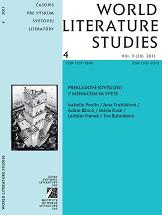Translation criticism in contemporary perspective
Kritika prekladu v perspektíve dneška
Author(s): Ladislav FranekSubject(s): Literary Texts
Published by: Ústav svetovej literatúry, Slovenská akadémia vied
Keywords: Literary criticism. Theory of literature. Empirism of language. Stylistics. Essencialism of literature. Cultural dialog.
Summary/Abstract: In the first part of the study, the author defines the status of translation criticism, which he considers to be an organic continuation of the theoretical and practical study of translation driving towards a feasible synthesis. The critic‘s point of view emerges from the tension between the different positions of the literary work in the foreign and domestic contexts. A two-pole translation process is therefore emphasized. In the next part the author discusses the term interference and points out the influence of empiricity on the diversity of regional and national expression (G. Mounin). The function of the language in stylistics is analyzed through French (Ch. Bally) and Slovak (A. Popovič, F. Miko) semiotic conceptions. After clarifying the principles of modelling and historical poetics (M. Bakoš), the study deals with cosmogonic essentiality in the neo-symbolist work of P. Claudel and the diversity of its translation reception in Slovakia, while commenting on the uneven socio-cultural development in France and Slovakia and the resulting stylistic and rhythmical shifts in the Slovak translations. The conclusion evaluates the cultural importance of Slovak criticism of translation, which is significant particularly in Jozef Felix’s symbiosis of historical erudition, theory and intuition. Its evidence is also the unique ability to use the sound-meaning of folk orality acquired through personal experience with literary translation (B. Hečko). The author finds this approach inspiring also for the young generation.
Journal: World Literature Studies
- Issue Year: III/2011
- Issue No: 4
- Page Range: 64-78
- Page Count: 15
- Language: Slovak

